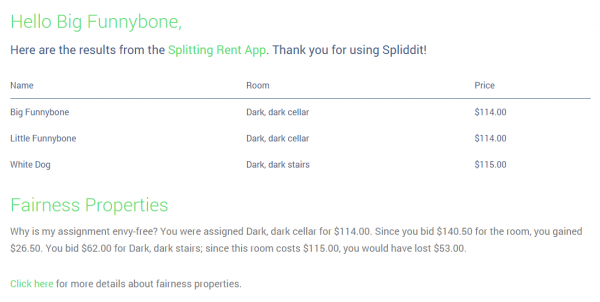Ariel Procaccia and Jonathan Goldman of Carnegie Mellon University have taken it upon themselves to make fair division problems easier to solve with a flashy new website called Spliddit (eyy, fuhgeddaboudit).
Someone comes up to you at a party, finds out you’re a mathematician, and there’s an awkward silence. Odds are good that you decide to break the silence by talking about the fair division problem. If it’s a birthday party, you might even get to point to a cake while doing so.
The problem with solutions to fair division problems is, while they’re very neat mathematically, they’re a bit tricky to put into practice. Pop maths author Alex Bellos demonstrated this admirably a while ago:
(I’m taking a bit of liberty so I can include that gif: the problem Alex is solving isn’t really a fair division problem. But I believe it illustrates the point adequately)
The real-world non-cake-related division problems are also hard to work out: how do you divide rent in a house where not everyone has the same sized room; how do you split up the booty from that spanish galleon; how do you assign proportional credit for a piece of group work? Those are the problems Spliddit aims to solve.
From the front page, after being reassured that you’re going to get a “provably fair” solution, (the first hint that some maths is involved) you pick the class of problem you want to solve and go to a page telling you what to do. As well as instructions, the site also describes the different definitions of fairness that it tries to satisfy, and gives a brief, readable description of the algorithm it’ll use. I’m particularly pleased that they give a link to the research paper on which their algorithm is based, in case you want to check their working.
Once you’ve read The Science Bit, you fill in a form with the requisite details about the problem. Each participant can either be emailed a link to the response page, or you can just pass on the URL the site gives you. Entering a bid is very easy and doesn’t require a sign-up (you can just bookmark a URL to see the results), which I liked.
Finally, once everyone’s submitted their bids, each participant gets a results page telling them how much rent they need to pay (or how much booty/credit they get), along with an explanation of how it was worked out.
All in all, I think Spliddit has done an excellent job of presenting some useful but otherwise obscure maths in a really accessible way. I’ll be keeping my eye out for opportunities to use it!


